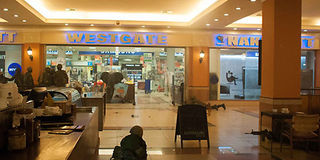MPs question committees' ability on Westgate probe

Kenyan troops take position during the attack on the Westgate mall in Nairobi on September 21, 2013. MPs Tuesday evening questioned the ability of their counterparts in the Defence and the National Security committees to investigate the attack at Westgate Shopping Mall and the reaction by the security agencies. AFP PHOTO/ JAMES QUEST
MPs Tuesday evening questioned the ability of their counterparts in the Defence and the National Security committees to investigate the attack at Westgate Shopping Mall and the reaction by the security agencies. (VIDEO: Military says soldiers carried water from Westgate)
Angered that the chairmen of the two committees had cleared the Kenya Defence Forces of accusations that they looted, the MPs asked Speaker Justin Muturi to rule on how much MPs should publicly say about on-going investigations.
Mr Muturi will make the ruling on Thursday.
National Security Committee chairman Asman Kamama and his Defence counterpart Ndung’u Gethenji were criticised last week after saying the KDF didn’t loot yet pictures emerged less than 24 hours later showing soldiers taking things from the mall.
The concerns came hours after the second day of meetings between the joint committee and the heads of the defence forces, the police and the intelligence service.
The matter was first raised by Rachel Shebesh (Nairobi County, TNA) who complained that even as the Justice and Legal Affairs team investigates the affairs of the Judiciary, some MPs have sprung to former registrar Gladys Shollei’s defence in public.
“There has been a tendency for members to discuss deliberations of committees before the committees have concluded the investigations and before that report has been tabled in this House,” said Ms Shebesh.
She said her concern was that because a lot of MPs are new and not very familiar with the House rules, they might not realise that whatever they were doing was in breach of the law.
ABILITY TO INVESTIGATE
Saying he didn’t doubt the ability of the committee to investigate the matter, David Ochieng’ (Ugenya, ODM) said his concern was whether it is the job of MPs to investigate on-going issues given that the police are still at Westgate.
“What I wanted your guidance on was whether committees of this House, in matters of security should engage in what I would call ‘primary investigations’. Should we allow this House to get evidence on what transpired before, during and after the attack in terms of knowing what needed to be done, who did what…?” he asked.
“Do we have the competence to read or to engage in forensic investigations? Do we have competence to engage in taking primary evidence from persons we are calling before us in a matter such as this? Do we have the equipment as a House committee to engage in this investigation?” he asked.
Mr Ochieng said the oft-expressed opinion outside Parliament is that the joint committee is meant as a cover-up of the events at Westgate.
“They (the public) are not convinced that we want to do a honest job,” he said.
Mr Ochieng also sought to know whether the joint committees should have awaited the report from the commission, yet to be set up, before they play their oversight role.
“Why don’t we allow these bodies to investigate then Parliament comes in when the time comes to do that oversight?” he said.
“We must as Parliament help this country to prepare to take action in future in case such actions happen. What has happened lately is that one two days after the incident, we are jumping into the matter, we are giving conclusive statements,” he said.
Arguing that Parliament has the power to conduct the investigation, Majority Leader Aden Duale however argued that MPs shouldn’t discuss matters still under investigation by committees.
He asked Mr Muturi to state where the boundary ought to be on discussions outside the committees.
He said although Parliament doesn’t have the ability to conduct investigations, it was within their ability to recommend action on those it feels are culpable.
His Minority counterpart Francis Nyenze was also critical of Mr Kamama and Mr Gethenji.
“It is good for MPs… to know our limitations in that we are not experts in investigation. It is good to direct and recommend investigations by those people who are trained,” he said.
He said MPs shouldn’t be making statements that border on ignorance or which would portray them as sycophants or protecting a certain class of people.
When he was given the chance, Mr Gethenji was defensive and argued that oversight didn’t necessarily mean that MPs should only move in after other bodies have finished their investigations.
“It would be dishonest of members of this House for us not to wish to interrogate the events around that attack yet the media has a free hand to publicise all manner of fabricated stories, indeed even including the illegal airing of evidence, forensic evidence, which is obtained directly from the security forces,” he said.
Mr Gethenji said some of the stories aired over Westgate are “completely devoid of facts.”
Arguing that showing the images amounted to terrorism, Mr Gethenji suggested that the current criticism of the law enforcement and the defence forces amounts to glorifying Al Shabaab.
“This House must recognise that today we are in a state of war against the Al Shabaab. Kenya is on a war footing and the people who do not facilitate and assist in the end of this war and who facilitate the furtherance the terror campaign are not with us. If you are not in the fight against the terrorists, then you are with the terrorists,” said Mr Gethenji.
He said that “political fingers” are now being pointed and that the media is encouraging this.
He urged the security forces to investigate how the CCTV images broadcast on TV were “leaked or procured.”





